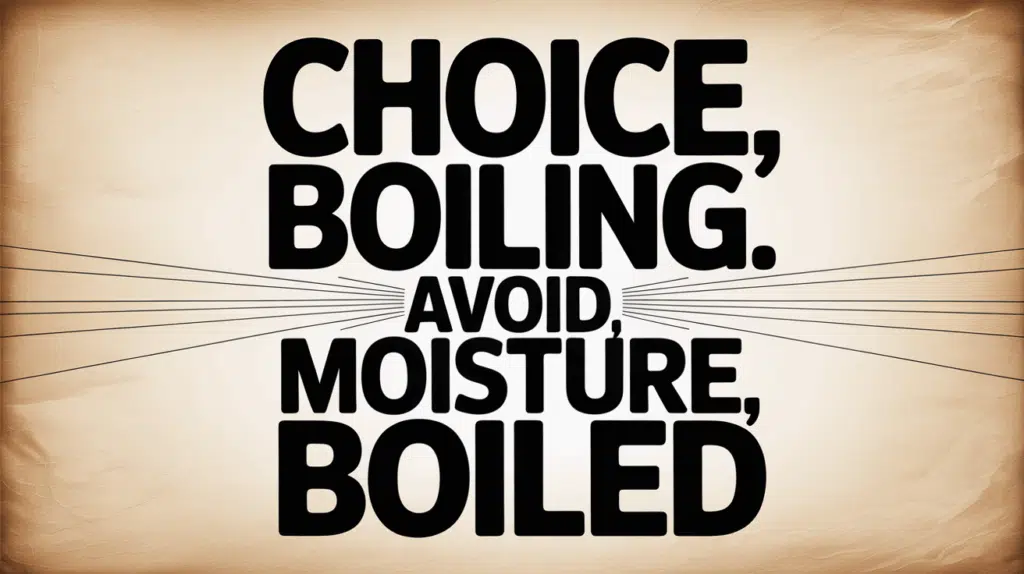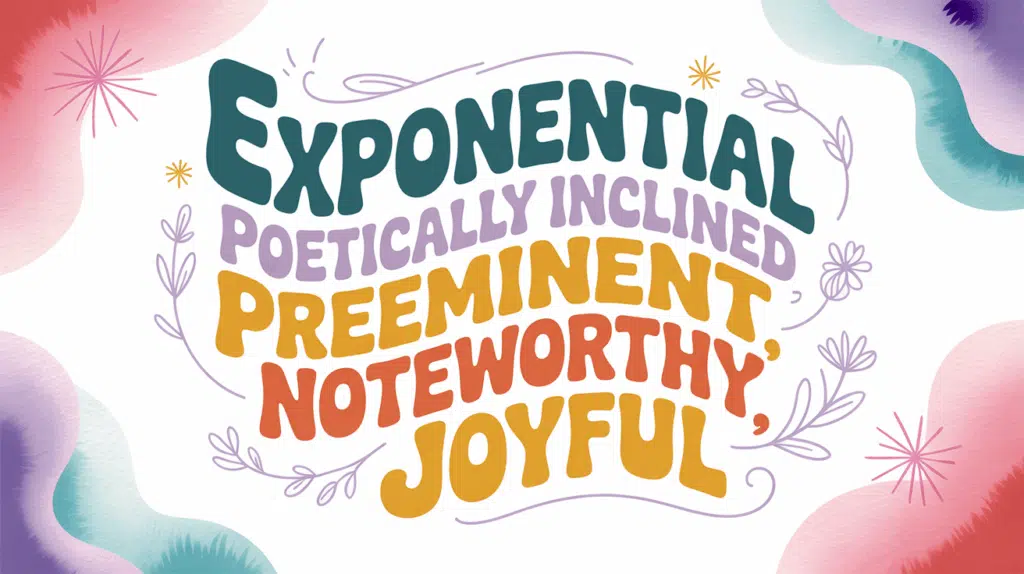Sound patterns make poetry sing, and the “oi” sound creates some of the most memorable moments in verse. Writers often struggle to find the right words that carry both meaning and musical quality.
But imagine having access to carefully selected oi words that can transform ordinary poems into rich, textured pieces.
This comprehensive oi words list offers poets, writers, and language lovers a treasure trove of creative possibilities.
From simple rhymes to complex sound schemes, these words can add depth and rhythm to any poetic work.
Let’s jump into this complete collection and see how each word can spark new creative directions.
Why “OI” Words Are Useful for English Language Learners?
The “oi” sound pattern serves as a crucial building block in English pronunciation. When learners master this diphthong, they gain confidence in speaking and improve their overall accent clarity.
These words also expand vocabulary in meaningful ways, giving students access to both everyday terms and expressive language.
In poetry, “oi” words create natural rhyme schemes and add musical quality to verses. They help writers express emotions more vividly.
Beyond creative writing, these words appear frequently in formal contexts too. Business reports, academic papers, and professional communication all benefit from a strong “oi” word vocabulary.
For language learners, this oi words list becomes a practical tool that bridges the gap between basic communication and fluent expression.
Common “OI” Words for Everyday Use

These familiar “oi” words appear frequently in daily conversation and writing. They’re perfect for beginners or anyone looking to build a strong foundation with accessible vocabulary.
1. Boil: To heat a liquid until it reaches its boiling point (verb)
2. Coin: A flat, typically round piece of metal used as money (noun)
3. Join: To connect or fasten things together (verb)
4. Soil: The upper layer of earth in which plants grow (noun)
5. Foil: A thin sheet of metal (noun)
6. Toil: To work hard (verb)
7. Spoil: To damage or ruin (verb)
8. Point: A particular spot or location (noun)
9. Moist: Slightly wet (adjective)
10. Oil: A viscous liquid derived from petroleum or plants (noun)
11. Voice: The sound produced by humans or animals (noun)
12. Choice: An act of selecting or making a decision (noun)
13. Boiling: The process of heating a liquid until it boils (noun/verb)
14. Avoid: To keep away from (verb)
15. Moisture: Water or other liquid diffused in a small quantity (noun)
16. Boiled: Heated until boiling (adjective)
17. Annoy: To irritate or bother (verb)
18. Employ: To hire or engage (verb)
19. Royal: Relating to a king or queen (adjective)
20. Rejoice: To feel joy (verb)
21. Toiled: Worked hard (verb)
22. Disjoint: To separate or disconnect (verb)
23. Poison: A substance that causes harm or death (noun)
24. Noisy: Making a lot of noise (adjective)
25. Voyage: A long journey (noun)
26. Spoiled: Damaged or ruined (adjective)
27. Joy: A feeling of great pleasure (noun)
28 Loyal: Faithful to a person or cause (adjective)
29. Recoil: To suddenly spring back (verb)
30. Boisterous: Noisy, energetic, and cheerful (adjective)
31. Pointed: Having a sharp end (adjective)
32. Coined: Created or invented (verb)
33. Rejoicing: Feeling or expressing great joy (noun/verb)
34. Disjointed: Disconnected or lacking coherence (adjective)
35. Ointment: A smooth oily preparation used for healing (noun)
36. Voicebox: The organ that produces voice (noun)
37. Poised: Balanced or composed (adjective)
38. Pointing: The act of indicating something (noun/verb)
39. Gloaming: Twilight or dusk (noun)
40. Anoint: To apply oil or ointment (verb)
41. Poisedly: In a poised manner (adverb)
42. Joint: A point where two things are joined (noun)
43. Appoint: To assign a job or role (verb)
44. Disappoint: To fail to meet expectations (verb)
45. Discoined: To deprive of coined money (verb)
46. Exploited: Used selfishly or unfairly (verb/adjective)
47. Coincide: To happen at the same time (verb)
48. Appointment: An arrangement to meet (noun)
49. Counterpoint: A contrasting element (noun)
50. Reappointed: Appointed again (verb/adjective)
Advanced “OI” Words for Poetic and Literary Use

These oi words list add depth and elegance to your poetry and creative writing. Perfect for writers who want to elevate their work with more complex vocabulary choices.
51. Noisome: Offensive or disgusting (adjective)
52. Broil: To cook by direct heat (verb)
53. Disenjoy: To lose enjoyment (verb)
54. Hoisin: A type of sauce (noun)
55. Alloing: Allowing (verb)
56. Unjoin: To separate (verb)
57. Boilover: A sudden overflow of boiling liquid (noun)
58. Discoiner: One who deprives of coined money (noun)
59. Bemoaning: Expressing sorrow (verb)
60. Poinsettia: A type of plant (noun)
61. Unanointed: Not anointed (adjective)
62. Overpointed: Overly pointed (adjective)
63. Unmoistened: Not moistened (adjective)
64. Disempowered: Deprived of power (adjective)
65. Tolerant: Showing tolerance (adjective)
66. Imposition: An unwelcome burden (noun)
67. Toleration: The act of tolerating (noun)
68. Poisonous: Containing poison (adjective)
69. Voyager: One who goes on a voyage (noun)
70. Unpoisoned: Not poisoned (adjective)
71. Postcoital: After sexual intercourse (adjective)
72. Poetically: In a poetic manner (adverb)
73. Prepossessing: Attractive (adjective)
74. Coil: To wind into loops (verb/noun)
75. Boilermaker: A type of drink or worker (noun)
76. Coincident: Happening at the same time (adjective)
77. Exponential: Increasing rapidly (adjective)
78. Poetically inclined: Having a poetic tendency (adjective phrase)
79. Preeminent: Famous, outstanding (adjective)
80. Noteworthy: Deserving attention (adjective)
81. Joyful: Feeling joy (adjective)
82. Joyous: Full of joy (adjective)
83. Refusing: Declining to do something (verb)
84. Exploring: Traveling to learn (verb)
85. Repost: To post again (verb)
86. Affoiled: Foiled (verb/adjective)
87. Pointlessly: Without purpose (adverb)
88. Broiling: Cooking with intense heat (verb)
89. Depoint: To remove a point (verb)
90. Subcoin: A subsidiary coin (noun)
91. Adjoined: Joined (adjective)
92. Pointlessness: Lack of point (noun)
93. Postboiling: After boiling (adjective)
Creative Ways to Use OI Words in Poetry
Poets can amplify the impact of oi words through various literary devices. Rhyme schemes work naturally with words like “voice” and “choice,” creating pleasing sound patterns.
Alliteration adds punch when combining “boisterous boys” or “pointed poison.” Assonance helps poets build mood through repeated “oi” sounds throughout their verses.
Different poetry forms offer unique opportunities for these words. Haiku benefits from the strong vowel sounds that create emphasis in short lines.
Free verse allows poets to scatter oi words freely, building rhythm without strict rules. Limericks practically sing when they include words like “avoid” and “annoyed.”
Here are some examples:
- “Her voice echoes through the void”
- “Coins glint in morning’s moist light”
- “The boy’s choice brought pure joy”
These techniques help writers create memorable, musical poetry that resonates with readers long after the final line.
Conclusion
This extensive collection of oi words list proves their remarkable versatility in poetic expression.
From simple rhymes to complex sound patterns, these words offer poets endless opportunities to create memorable verses.
They bridge the gap between technical skill and artistic beauty, giving writers tools to craft both meaningful and musical poetry.
Now it’s time to put this oi words list into practice. Pick a few words that speak to you and start experimenting.
















